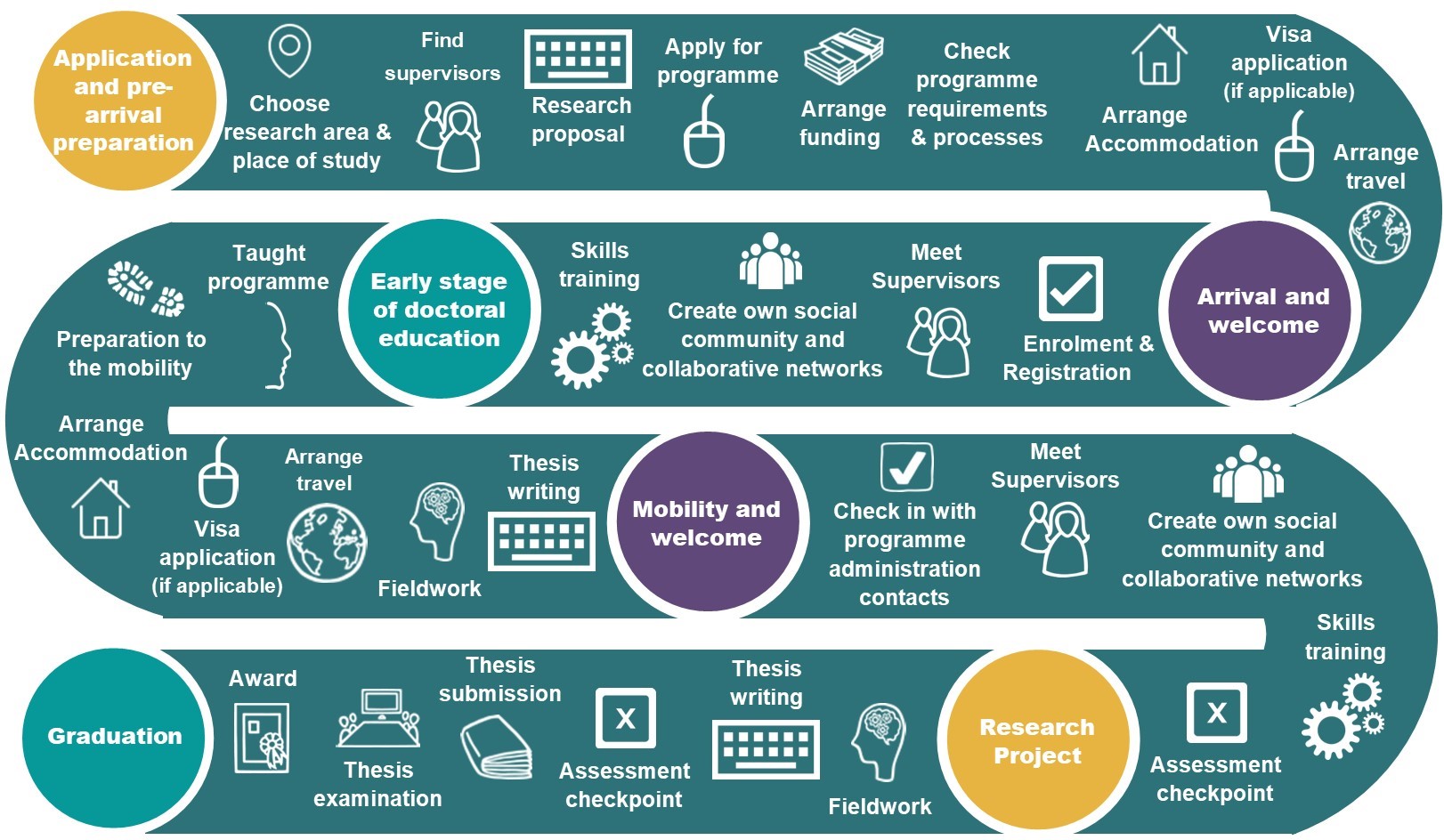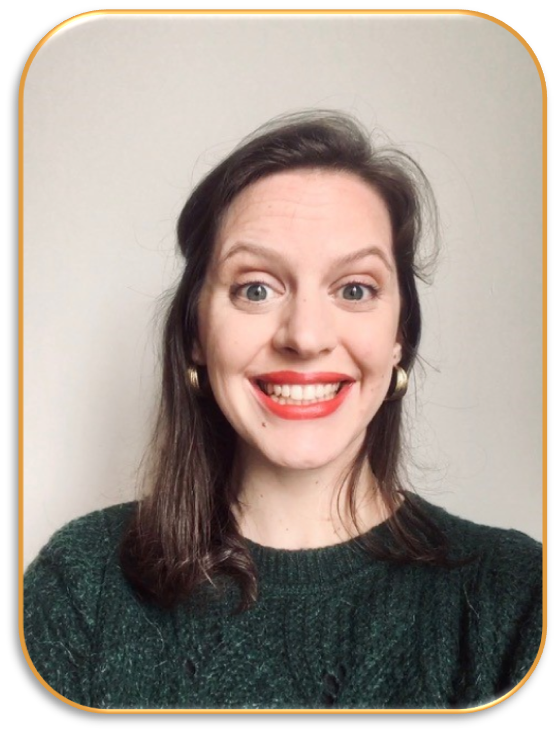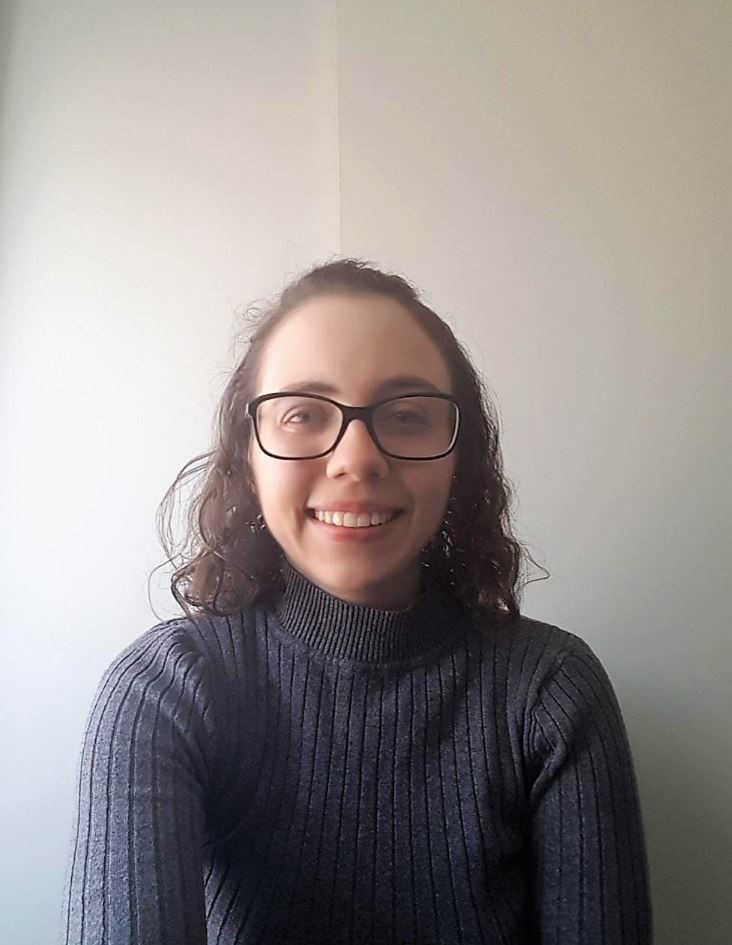Experience of a joint international programme
Each doctoral candidates’ journey of undertaking a joint PhD is different due to the differences between universities, countries, and programmes; but the commonalities are shown in the infographic below giving you an idea of what to expect, though not all of these experiences will be relevant to you and might happen in a different order. More detail is available about the practical information for your relocation, and programme information.

An infographic showing a journey from application and pre-arrival preparation, to arrival and welcome, to early stage of doctoral education, to mobility and welcome, to research project and finishing with graduation. The journey includes activities relating to choosing research area and place of study, finding supervisors, applying for the programme and arranging funding, checking programme requirements and processes, accommodation, visa, travel, enrolment, networks, skills training, mobility preparation, fieldwork, thesis, assessment checkpoint, thesis submission, thesis examination, and finally the award.
Real-life experiences
Our doctoral candidates know how valuable it is to learn from the experiences of peers and have shared their insights to help you with your decision making and navigating your joint PhD.

Name: Flavie Epié
Research topic/area: Literature & Translation Studies
Undertaking a joint doctoral programme at: Antwerp University and Bordeaux Montaigne University
About me: Doing a joint PhD provided me with the ideal set-up to best conduct my research project—two promotors, who each specialize in part of my research, and two research teams to submit questions, queries, and work with. In view of the future, I also find the perspective of a joint diploma useful, as well as the possibility to discover two different university cultures in depth.
Of course, a joint doctorate is not without challenges, such as looking for funding to plan your trips back and forth, fully grasping the requirements from both institutions to complete and navigate the programme, or the sense of in-between-ness that working at two places at the same time can sometimes elicit.
But overall, the cultural aspect as well as the facilitated access to experts in my field were, to me, invaluable, and I could not recommend a joint PhD enough if you’re an organized, curious person willing to put time into broadening your perspectives and meet new people!
Things you need to be aware of and consider in advance
The cost of the programme, because you might need to pay yourself for trips to and stays at your partner institution (transportation, accommodation; also make sure to make enquiries about scholarships to help fund your six-month stay!) and your willingness to live in a foreign country and get accustomed to a new university system.
Flavie’s Top Tips for a joint international doctorate
- Keep yourself informed about the programme requirements in both institutions (e.g. where are you supposed to complete your courses? where will you defend your PhD? which institution are you allowed to ask for funding for research trips? etc..)
- Be organized as you will need to keep the research going from different places and schedule trips back-and-forth in advance.
- Make sure to communicate with your promotors, they are here to help!
- And finally, take some time off work to get to know your partner institution city better and enjoy being immersed in a new culture!
Name: Cintia Granja
Research topic/area: Economics (topic: Attitudes Towards Inequality)
Undertaking a joint doctoral programme at: Maastricht University (Netherlands) and University of Campinas (Brazil)
I would recommend doing a joint degree because:
- It expands your network, as you will have the chance to work with more people, having access to more career opportunities.
- You will have the chance to work/live in different environments, which is beneficial not just in academic/professional terms, but also in terms of personal experiences.
- If the universities are in different countries, you may also have the chance to learn/improve other languages.
Things you need to be aware of and consider in advance
- Your workload will be higher, and depending on which time zones your supervisors are, you may have to work outside regular working hours.
- You will have responsibilities with two different universities, so it is important to be very organized to be able to do all your tasks and duties within the agreed deadlines.
Cintia’s Top Tips for a joint international doctorate
- Communication with the supervisors is the key to survival, as it may be the case that you will be the person mediating (and sometimes translating) the communication between them.
- It is very important to be aware of all requirements and deadlines from both universities, so make sure to carefully read the joint degree contract before signing it, to be aware of all your duties as a joint degree student.
Other topics
Why choose an international joint PhD?
Choosing your research and places of study
Programme information
How to work succesfully with your supervisors
Practical information for your relocation
Research, skills, and career
Experience of a joint international programme
Contacts

